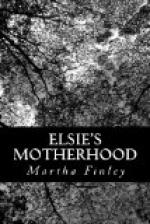A slight shudder ran over Sophie’s frame. “Boyd?” she said, drawing her chair nearer and speaking in an undertone, “he is my great dread, and for fear of wounding mother’s feelings I have had to keep my terrors to myself. I know that he is often out, away from the plantation, all night. I have for weeks past suspected that he was a Ku Klux, and last night, or rather early this morning, my suspicions were so fully confirmed that they now amount almost to certainty. I had been up all night with Daisy, and a little before sunrise happening to be at the window, I saw him stealing into the house with a bundle under his arm,—something white rolled up in the careless sort of way a man would do it.”
“I am not surprised,” said Mr. Dinsmore, “he is just the sort of man one would expect to be at such work,—headstrong, violent tempered, and utterly selfish and unscrupulous. Yet I think you may dismiss your fears of him, and feel it rather a safeguard than otherwise to have a member of the Klan in your family.”
“It may be so,” she said, musingly, the cloud of care partially lifting from her brow.
“And at all events you are not without a protector, dear sister,” whispered Rose, as she bade adieu. “’A father of the fatherless, and a judge of the widows is God in his holy habitation.’”
Elsie too had a word of sympathy and hope for her childhood’s friend, and with warm invitations to both the Oaks and Ion as soon as Daisy could be moved with safety, they left her, greatly cheered and refreshed by their visit.
“My heart aches for her,” Elsie said as they drove away, “what a sad, sad thing to be a widow!”
“Yes;” responded Rose, “and to have lost your husband so,—fighting against the land of your birth and love.”
There was a long pause broken by a sudden, half frightened exclamation from Rosie. “Papa! what if we should meet the Ku Klux!”
“Not much danger, I think: they are not apt to be abroad so early. And we are nearing Ion.”
“I presume Edward has reached home before us,” remarked Elsie, “I wonder how my little ones enjoyed their first visit to Roselands without their mother.”
She soon learned; for she had scarcely set foot in the veranda ere they were clinging about her and pouring out the story of their terrible fright.
She pitied, soothed and comforted them, trying to dispel their fears and lead them to forgive those who had so ill-used them, though it cost no small effort to do so herself.
Chapter Tenth.
“Forgive, and ye shall be forgiven.”
—Luke vi, 87.
Calhoun Conly was much perturbed by the occurrences of the evening. He was fond of his cousin Elsie and her children, and very sorry, for both her sake and theirs, that they had suffered this fright; he greatly respected and liked Mr. Travilla too, and would fain have stood well in his esteem; he had hoped that he did; and also with his Uncle Horace,—he had been so kindly treated, especially of late, at both Ion and the Oaks; but now this unfortunate episode had placed him in a false position, and he could hardly expect to be again trusted or believed in.




